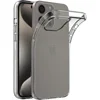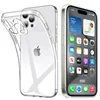The iPhone 16e is Apple’s most affordable model in the iPhone lineup. It replaces both the iPhone 14 and the iPhone SE and is a departure from the “classic” design of those older SE phones. Here’s everything you need to know about the new phone:
From iPhone SE to iPhone 16e: Name change
With the release of the iPhone 16e, Apple dropped the iPhone SE from its lineup. Apple has not given any reasons for the name change but it indicates that Apple will perform annual updates to the “e” model.
New iPhone 16e price: How much does the iPhone 16e cost?
- The iPhone 16e starts at $599/£599
While the iPhone 16e is Apple’s cheapest iPhone, its price is higher than the iPhone SE replaced. Here is a chart of how the iPhone 16e compares to previous iPhone SE models.
| 32GB | 64GB | 128GB | 256GB | 512GB | |
| iPhone 16e (2025) | — | — | $599/£599 | $699/£699 | $899/£899 |
| iPhone SE (3rd gen, 2022) | — | $429/£429 (was £449 at launch) | $479/£479 (was £499 at launch) | $579/£579 (was £609 at launch) | — |
| iPhone SE (2nd gen, 2020) | — | $399/£419 | $449/£469 | $549/£569 | — |
| iPhone SE (1st gen, 2016) | $399/£379 | — | $499/£449 | — | — |
Higher component pricing and the effect of higher import duties are likely to lead to higher prices. Additionally, the iPhone 16e is not really being positioned as a “budget” option. Apple tends to have a $100 jump between handsets, with the iPhone 16 starting at $799 and the iPhone 15 at $699. The $599 iPhone 16e sits perfectly behind the iPhone 15. Bloomberg’s Mark Gurman claims the iPhone 16e is intended to help Apple compete with low-end Android phones in China.
iPhone 16e design: How is the new iPhone different than the SE?
The iPhone 16e is a major design change from the iPhone SE. It moves away from the iPhone 8 chassis to something more like modern iPhones, with Face ID and a full-screen display.
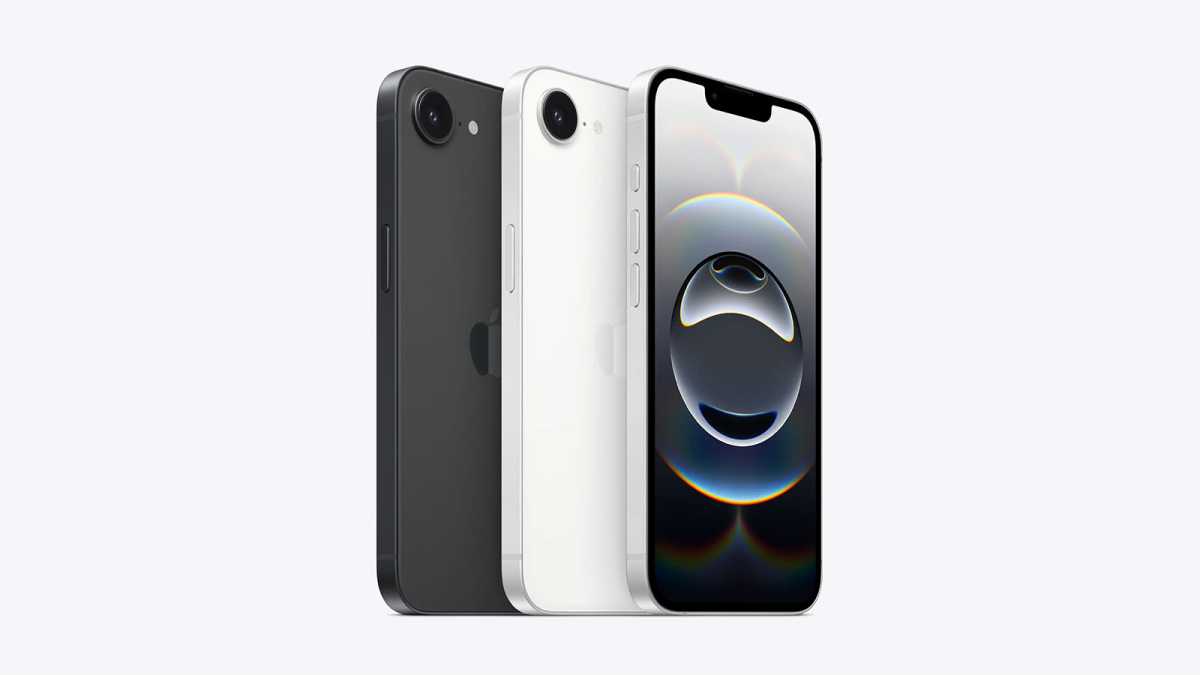
Apple
Face ID instead of Touch ID
Touch ID, which has been a staple of the SE line since its debut, is gone. This is bad news for those who prefer a Home button with a fingerprint sensor–Apple no longer has a phone like that in its lineup.
A notch but no Dynamic Island
The iPhone 16e has a notch, like the one on the iPhone 14. It does not have the Dynamic Island that is on the other iPhone 16 models. So while you’re getting a much larger screen than before, you won’t be able to see alerts and current activities in the Dynamic Island.
Action Button is the new mute switch
The iPhone 16e has an Action Button instead of a mute switch, which was standard on all previous iPhone SE models. The Action Button can be customized in a variety of ways, including as a mute switch.
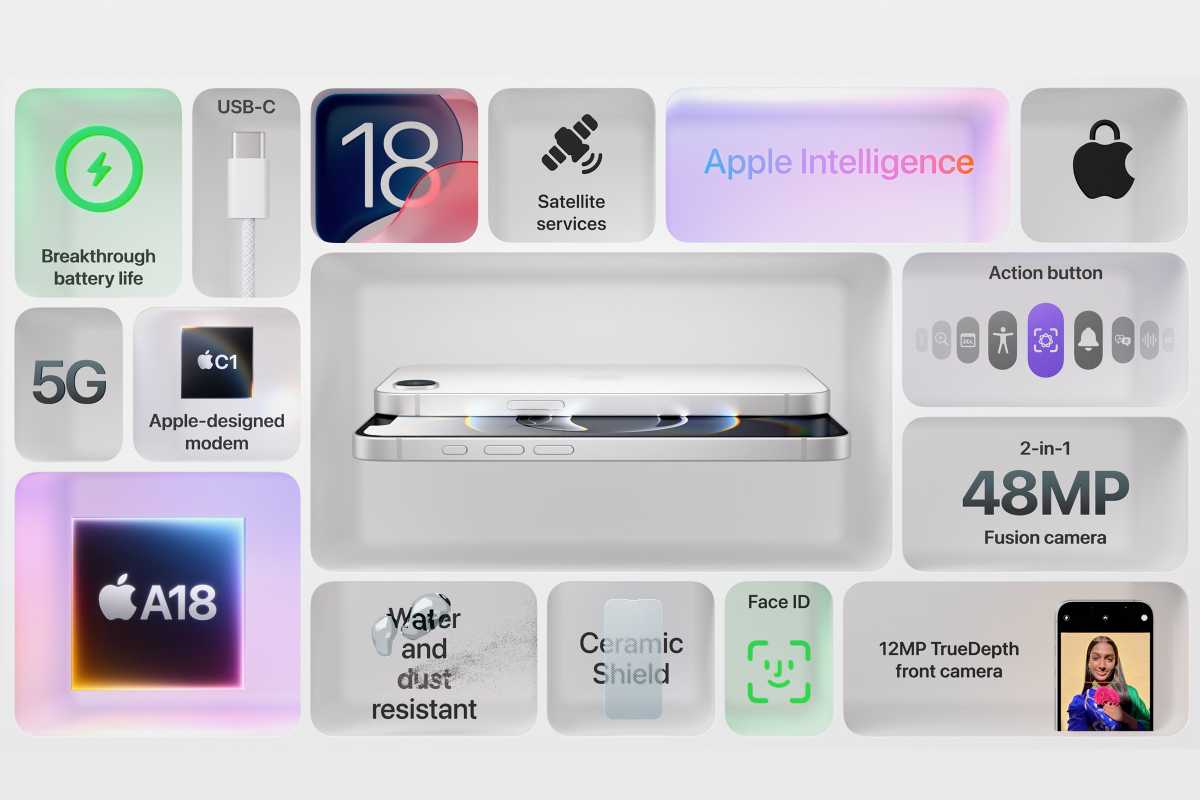
Apple
iPhone 16e specs: Apple Intelligence support and a lot more
Like the other iPhones in Apple’s current iPhone 16 lineup, the iPhone 16e supports Apple Intelligence. One of the biggest new features, a massive expansion of Siri capabilities, is due for release in iOS 18.4 in March or April.
Processor & RAM
Like the iPhone 16 and 16 Plus, the iPhone 16e has an A18 chip with 8GB of RAM, a massive upgrade over the A15 chip with 4GB of RAM in the SE. However, the A18 chip is a little less capable than the one in the iPhone 16, with 4 GPU cores versus 5 GPU cores on the iPhone 16.
5G modem
The iPhone 16e is the first iPhone to feature Apple’s own 5G modem, called the C1. It supports sub-6GHz 5G and 4G LTE with 4×4 MIMO, and Apple calls it “the most power-efficient modem ever on an iPhone.” As previously expected, it does not support the faster mmWave 5G connectivity but neither did the previous SE.
USB-C
The iPhone 16e has a USB-C port for charging and data transfers. With its introduction and the discontinuation of the iPhone SE, Apple no longer has an iPhone with Lightning in its current lineup.
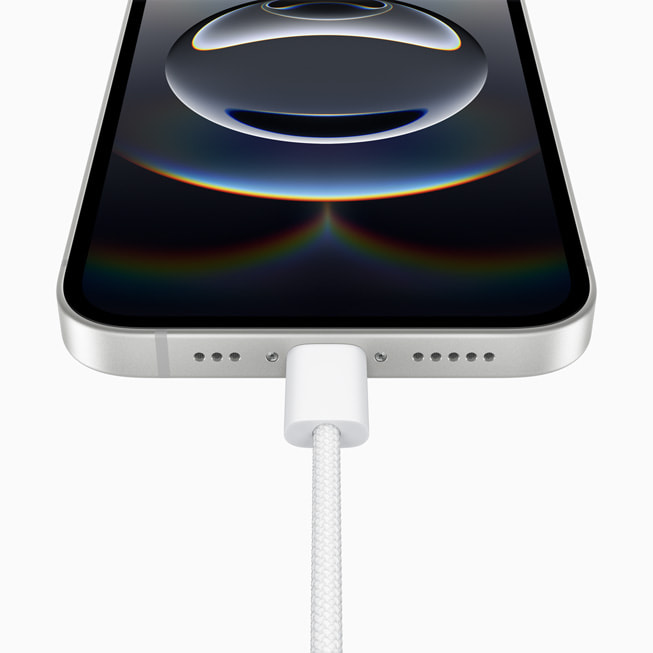
Apple
Wi-Fi and Bluetooth
The iPhone 16e supports Wi-Fi 6 and Bluetooth 5.3. This is a bit of a downgrade—Apple has supported iPhone 6E since the iPhone 15 Pro and all of the other iPhone 16 models have WiFi 6E. However, you’ll need to connect to a newer WiFi 6E or 7 router to enjoy the faster speeds.
Storage
The new iPhone 16e is the last iPhone to move to 128GB of storage, doubling the 64GB base storage in the iPhone SE 3. The iPhone 16e is also available with 256GB or 512GB of storage for $699 and $899, respectively.
Camera
The iPhone 16e has a single 48MP lens on the rear. It’s a 48MP camera that can record video in 4K with Dolby Vision up to 60 fps and also supports Spatial Audio. Apple calls it a “2-in-1 camera system,” described as having an integrated 2x telephoto capability.
The front-facing camera is a 12MP TrueDepth camera, like the other iPhone 16 models. We got our first look at a “dummy model” for the new iPhone 16e in January from leaker Sonny Dickson, and it showed an iPhone 14-like smartphone with a single rear camera.
iPhone 16e release date
- The iPhone 16e was announced on February 19, 2025. Pre-orders start on February 21, with shipments starting on February 28.
The iPhone 16e replaced Apple’s iPhone SE, with a similar release timeline that occurred months after the September release of the standard iPhone and the iPhone Pro models. The iPhone SE had much longer intervals between updates; it remains to be seen if Apple will switch to an annual schedule with the “e” model. Here’s when the three previous iPhone SE models made their debut:
- iPhone SE (3rd gen): March 2022
- iPhone SE (2nd gen): April 2020
- iPhone SE (1st gen): March 2016
iPhone history
The iPhone 16 range and the iPhone 15 are the current-generation models available from Apple. We’re also expecting iPhone 17 to launch in late 2025. Below you can find links to our reviews of all iPhone models, including the latest generation. Learn more about all the new Apple products coming this year and when is the next Apple event. You might also want to check out our advice on when is the best time to buy a new iPhone, our iPhone buying guide, and our comparison of every iPhone that is available to buy today.
- Original iPhone (2007) review
- iPhone 3G (2008) review
- iPhone 3GS (2009) review
- iPhone 4 (2010) review
- iPhone 4s (2011) review
- iPhone 5 (2012) review
- iPhone 5c (2013) review
- iPhone 5s (2013) review
- iPhone 6 (2014) review
- iPhone 6 Plus (2014) review
- iPhone 6s (2015) review
- iPhone 6s Plus (2015) review
- iPhone SE (1st generation; 2016) review
- iPhone 7 (2016) review
- iPhone 7 Plus (2016) review
- iPhone 8 (2017) review
- iPhone 8 Plus (2017) review
- iPhone X (2017) review
- iPhone XR (2018) review
- iPhone XS (2018) review
- iPhone XS Max (2018) review
- iPhone 11 (2019) review
- iPhone 11 Pro (2019) review
- iPhone 11 Pro Max (2019) review
- iPhone SE (2nd generation; 2020) review
- iPhone 12 (2020) review
- iPhone 12 Mini (2020) review
- iPhone 12 Pro (2020) review
- iPhone 12 Pro Max (2020) review
- iPhone 13 (2021) review
- iPhone 13 mini (2021) review
- iPhone 13 Pro (2021) review
- iPhone 13 Pro Max (2021) review
- iPhone SE (3rd generation; 2022) review
- iPhone 14 (2022) review
- iPhone 14 Plus (2022) review
- iPhone 14 Pro (2022) review
- iPhone 14 Pro Max (2022) review
- iPhone 15 (2023) review
- iPhone 15 Plus (2023) review
- iPhone 15 Pro (2023) review
- iPhone 15 Pro Max (2023) review
- iPhone 16 & 16 Plus review
- iPhone 16 Pro & Pro Max review


